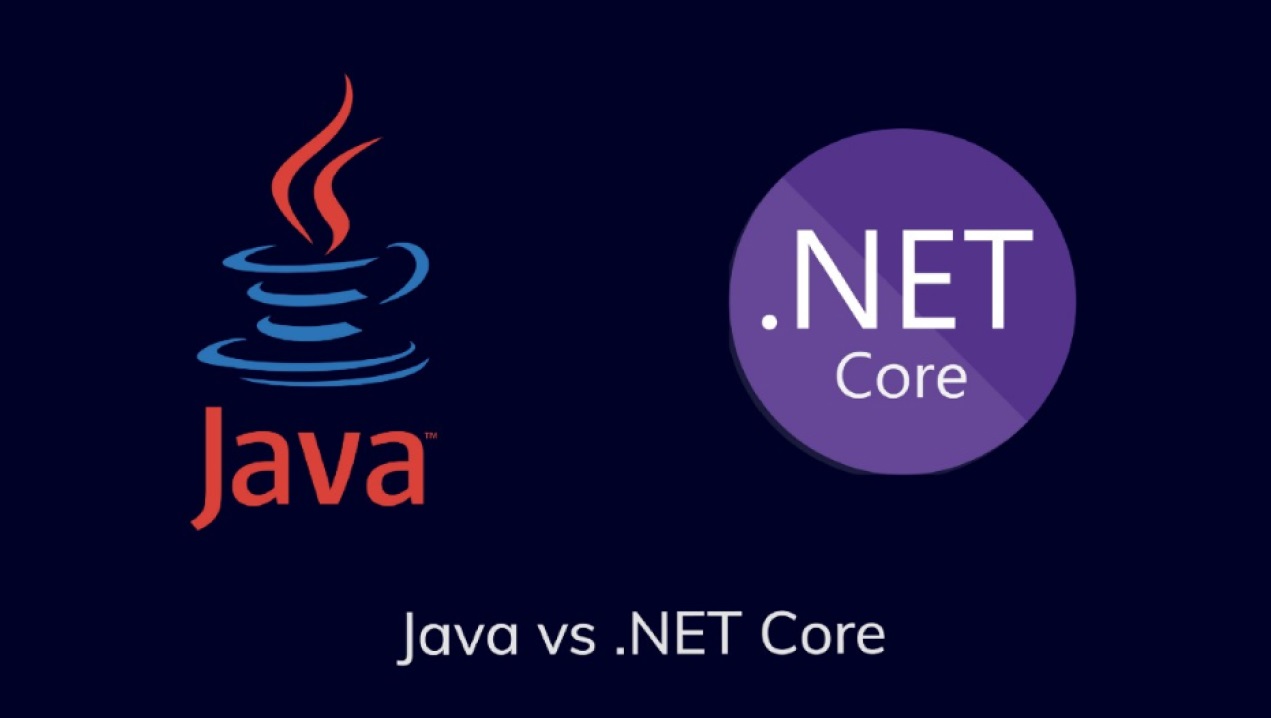The technologies we are about to discuss are at the forefront of the development of all sorts of software. Everyday, media, corporate, mobile, enterprise solutions - you name it. So the NET vs Java competition is intense. But no clear leader has yet been identified.
A good programmer must know their subject area far and wide, staying familiar with all available technologies and languages. However, choosing the right tool for a particular project can be difficult, and this choice affects the overall project performance in the long run.
At EXB Soft, we have been successfully employing both solutions to meet our clients’ demand, so here goes an elaborate NET vs Java comparison to help you keep things clear.
The Differences and Similarities of Java and .NET
Java
Java is a cross-platform, object-oriented, web-centric programming language that allows you to write less code from scratch during application development and can be used as a project’s backbone platform. Introduced by Sun and Oracle, it has existed for 26 years and is now used in almost all industries: from eCommerce to IoT and Big Data. Today, Java is the 5th most popular language among developers, and many believe its potential has not yet been fully revealed.
.NET
.NET is a software creation environment developed by Microsoft in 2002 and originally focused on users of Microsoft products. The platform had a closed source code and limited use, but Microsoft worked on the bugs and released the limitations-free NET Core (NET5) in 2016. Since then, .NET has been enabled to run such languages as C#, C++, F#, etc., and follow an object-oriented paradigm.
On top of that, in 2022, Microsoft released Community Toolkit 8.0, the successor to the Windows Community Toolkit — a collection of helper classes and APIs that developers can use regardless of the specific UI platform. All because the number of API libraries using .NET, which are not designed to work with Windows, has grown over time. .NET can be also used in mobile development.
Both options provide extensive libraries, tools, and community support. On the surface, .NET can boast of faster time-to-market for new releases, while Java is known for its inherent cross-platform compatibility. These days, PHP solutions for medium-sized and early-stage projects are mostly implemented on .Net, and almost all large projects are implemented on Java. Although, according to our experience, we can say that the paradigm is shifting.
But let’s go a bit deeper than the surface level and make out some pros and cons, as well as more felt differences and similarities between the two tools in question:
.Net
- The platform is expanding, and the learning curve is becoming more accessible by the day;
- The set of .NET frameworks comes mainly from one manufacturer, which might make it easier to break into someone else's code;
- There are certain backward compatibility issues, which can be a felt drawback in practice.
- Has been the “market’s sweetheart” for the longest time, accumulating a huge array of knowledgeable and skilled people over time;
- Requires more substantial preparation;
- There are tons of compatible third-party frameworks. If you are seeking certain functionality, chances are someone has already implemented it in their library. On the other hand, it is easy to get lost in this diversity.
- Supports backward compatibility up to the most ancient versions. Provided the code is written correctly, you can easily run it on your Linux even if it was originally compiled in MS-DOS back in 1997.
Java was originally created with an eye on different operating systems. The platform provides a JVM virtual machine that allows you to run code on any device. .NET is also used to create a range of application formats. All in all, both solutions often perform similar functions.
Similarities
- Both technologies are widely employed, including by well-known companies;
- Both are object-oriented;
- The multi-level architecture and modular structure of the code provide easy debugging and the possibility of code reuse.
Differences
A vast majority of websites are developed using .NET, while most of their server part is written in Java. .NET offers great flexibility. And its core is more secure than any other open-source platform.
Java can be considered a platform focused on JE environments such as J2EE. JEE etc. But due to a lack of resources, there may be security problems. On top of that, the JVM requires code translation, so it runs more slowly.
Integrated Development Environments (IDE)
IDE helps to code and test software applications, as well as maintain their documentation. Java offers many IDE options, but the most popular ones are Oracle NetBeans, Eclipse, IntelliJ Idea, and Oracle JDeveloper. The latter was created specifically to simplify development and testing. The Java IDE can also be customized and turned into built-in plugins. And even beginner coders can use them easily.
Java applications are compiled into a special byte code executed on the JVM. It checks whether all the instructions are correct and safe. Then, it assembles modules and establishes connections between names while searching for missing modules both locally and over the Internet at the same time.
The byte code is the same for all platforms and architectures. Thus, the developer, having written and debugged the code, can be sure that it is fully compatible with different platforms unless they are looking for functions not supported by Java on other platforms)
The JIT compiler (Just In Time compiler) is responsible for translating the byte code into processor instructions, which preliminarily (or dynamically) compiles the byte code into instructions "adapted" to the software and hardware environment.
However, code optimization via JITter from .NET is perfected. It supports native application compilation not into intermediate but directly into machine code (Native AOT). This cuts startup time and memory usage, allowing specialists to work on platforms with limitations.
Furthermore, .NET’s Microsoft Visual Studio is a whole set of IDEs by default, the functions of which help to create all types of applications. At the same time, there is a Common Language Runtime (CLR) - a complex software device designed to erase the boundaries between different programming languages. It easily executes programs whose parts are written in different languages. How is compatibility achieved? It turned out that Microsoft invented another language for this - IL (Intermediate Language).
.NET vs Java performance and compatibility
Java does not convert code to machine language until it is executed. This slows down the performance of applications. But it is more flexible and provides wider compatibility.
The .Net code is compiled and launched right in the system where that code is deployed. The flexibility is narrower, but the speed of work is higher. Plus, it is more effective, durable, and reliable as a whole.
The main language of .NET - C# uses the Just-in-Time compiler, which usually puts less load on the processor and reacts faster. Java can provide high performance, but it will require a lot of memory.
C# has several more low-level structures that allow better process optimization. And this ensures fast allocation and no memory overhead. But Java provides faster access to databases.
Microservices
Both solutions use the Architect methodology, which simplifies development. The application is divided into several parts, each performing a unique function. But Java has a clear advantage here. Its compilers generate byte codes that do not depend on computer architects. So you can create complex applications that read well.
Both platforms support Visual Studio. On the other hand, C# also offers Mono Develop. Models of this language are more extensible and produce lighter applications, but it still lags behind Java in terms of overall reliability.
Summarized pros and cons
Java
Pros:
- Enables reusable code;
- A simple learning curve;
- Platform independence.
Cons:
- Consumes more memory by running on top of the JVM;
- Tends to run much slower.
Security is an eternal concern, where platform-independent solutions can pose all sorts of threats at any time.
.NET
Pros:
- The Azure SDK package for .NET, designed to simplify the use of Azure services in .NET applications, greatly facilitates the organization of CI/CD;
- Framework Class Library (FCL) - a storehouse of over 10,000 ready-to-use types. These include types for working with files, databases, web solutions, etc. Comparing FCL with the poor Java API is simply pointless;
- Assemblies can be considered as packages that can contain different parts of the application, both the exe file itself and individual modules. The CLR allows you to run applications even if some modules are missing. This greatly simplifies the deployment of programs. Yes, the programmer can sell the entire program, as well as additional functions separately.
- Ensures that applications get exactly the library required with the help of public and private keys. Assemblies also completely exclude work with the registry. Now, installing the software comes down to copying files. This solves the problems of "clogging" up the operating system and reduces the probability of program failures.
- ASP.NET provides a new programming model based on the .NET Framework. With the help of this technology, you can easily create web forms and reusable components, as well as web services;
- .NET does not bind you to the use of one language. Moreover, it is possible to write .NET applications in Java on J#;
Cons:
- Despite the open source code, the development requires large costs for services;
- The tools in the environment can be extremely complex and demanding, and the structure and documentation often change.
Models of compilation and execution of Java and .NET applications are quite similar. In both cases, the result is some intermediate code, which is then processed by the IDE.
The performance of .NET applications for most tasks is significantly higher due to the fact that JIT compilation is implemented at the level of methods, not classes. In the case of Java, in turn, even if the operation of the application requires the call of only one specific method in the class, a full compilation of the intermediate code of the class will occur. This leads to extra work and a drop in general productivity.
Assessing Java versus .NET
It all comes down to this - C# takes the cake. However, Java has specific advantages: more open-source libraries and more options for tackling common issues.
If you choose a web service framework, you will most likely have at least 30 options in Java, and maybe only 5 in .NET. But in any case, you will only use one of them, so the variety of Java helps, but it can also confuse. And if there is no dominant choice, diversity only complicates the search for well-proven solutions.
So if you don’t have any specific demands, .NET is always a safe choice. Keep in mind also that there are tons of enterprise Java solutions out there, and hardly anyone will decide to take a working application and rewrite it under .NET. But if you are creating a new app from scratch, the advantages of C# should make themselves felt.
Although both languages have many differences, they are quite similar at the same time. But we can already see a standing-out counterpart.
Bottom Line
When comparing Java vs. .Net, keep in mind that both are excellent languages, and the exclusive choice depends on the skills of the developer, the requirements of the client, and the infrastructure of the project. Cost is an important factor in the choice, as well.
Java is best suited for mobile platform development. But if you are creating a full-scale computer solution or just need a universal framework with a good implementation, you should use .Net. It is best suited for projects related to web services and APIs. So make sure to analyze your requirements and preferences thoroughly.
That can be a difficult task for your in-house team and an overly complex effort to take on single-handedly. But we are ready to help you with just the right amount of expertise and experience.
Give us a call to get a working platform and professionals that will create a market-defining, competitive product for you.
F.A.Q
Java is a robust, platform-agnostic, object-oriented programming language extensively utilized in diverse domains such as eCommerce, IoT, and Big Data. It ensures cross-platform compatibility through its JVM (Java Virtual Machine). .NET, developed by Microsoft, is an extensive framework supporting multiple languages like C#, C++, and F#. It is known for its rapid deployment capabilities, comprehensive libraries, and high performance.
Both .NET and Java are leading object-oriented technologies with a wealth of libraries, development tools, and active community support. They share a multi-tiered architecture and modular code structure, facilitating seamless debugging and efficient code reuse.
Advantages: Java promotes reusable code, features a straightforward learning curve, and ensures platform independence. Disadvantages: Java operates on top of the JVM, leading to higher memory consumption and potentially slower execution speeds. Additionally, platform-independent solutions can introduce security vulnerabilities.
Advantages: .NET offers a streamlined CI/CD process with the Azure SDK, a vast Framework Class Library (FCL), and simplified software deployment. Disadvantages: Despite being open source, .NET development incurs significant costs for services and tools, and its environment can be complex and resource-intensive.
In .NET, code is compiled and executed directly within the system, providing superior speed and efficiency but limited flexibility. Java, conversely, does not translate code to machine language until runtime, offering greater compatibility but potentially slower performance.
Both .NET and Java utilize the Architect methodology for microservices, though Java has a distinct advantage due to its compiler generating platform-independent byte code. While C# offers more extensibility, Java maintains higher reliability.
The decision between .NET and Java hinges on project specifics, developer expertise, client requirements, and cost considerations. Java excels in mobile platform development, while .NET is better suited for comprehensive computer solutions, web services, and API development.



